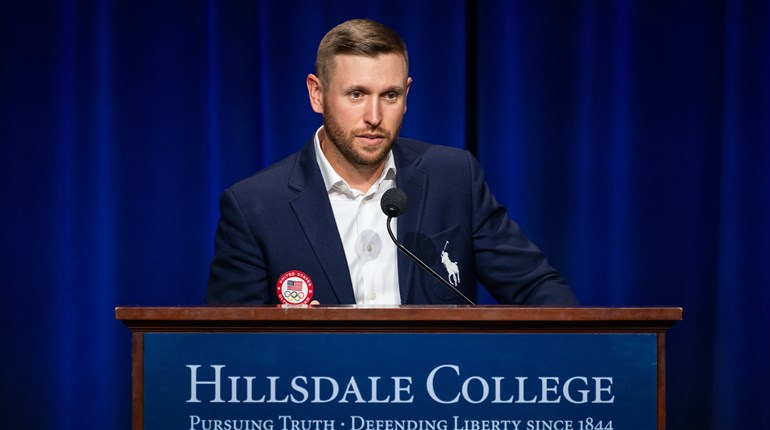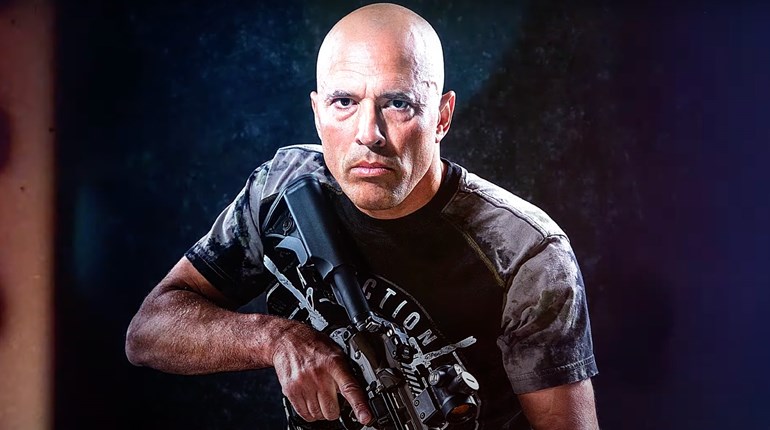
The gun-control movement has found that, by focusing its attention on corporations and their boards, they might be able to bypass the democratic process altogether and thereby accomplish their gun-control desires without having to win a single vote.
What need is there for legislation if one can simply pressure banks into declining credit or services to the makers and sellers of guns? Why bother attempting to convince the public—and, eventually, the courts—when one can push a handful of software giants to prohibit firearms from their platforms? What good is the combined power of a hundred million gun owners when one has the whims of a monopoly in one’s pocket? Once upon a time, the enemies of the Second Amendment dreamed of using the government to order American industry around—or, even, to take it over. Increasingly, they just pick up the phone and ask their friends on the top floor. In this area, at least, politics is not so much “downstream of culture” as it is entirely separate from it.
It represents a considerable irony that many of the same people who like to issue grave warnings about the outsized influence of “corporate America” are thrilled by the prospect of recruiting those corporations to their side in their fight against the Second Amendment.

Salesforce, PayPal, Bank of America, Facebook, Delta Air Lines, Stripe and Dick’s Sporting Goods may be the sort of giant, sprawling, powerful companies that we are routinely told represent a threat to the rights and the prospects of the “little guy,” and yet, having lost in statehouse after statehouse, in court after court and in one Congress after another, the gun-control movement and its allies have begun to wield these institutions in precisely the manner that, in any other context, they would cast as a mortal threat to the republic.
If left unchecked, this development could be fatal to the Second Amendment. Much as the spread of “cancel culture” threatens to hollow out the First Amendment, the co-opting of large private institutions by forces that are implacably hostile to the Second Amendment threatens to hollow out the right to keep and bear arms.
Over the last decade or so, America’s courts have begun to consistently strike down what can be best described as “auxiliary” restrictions on the Second Amendment—laws that do not explicitly limit the right, but that, by design, render it almost impossible to exercise. Good examples of this approach have been taken head-on in Illinois, California and New York, in which hostile lawmakers have sought to close or prevent people from opening gun ranges, gun stores and concealed-carry training facilities, and, in the case of New York City, have imposed draconian transportation limitations to make bearing arms impossible.
…the co-opting of large private institutions by forces that are implacably hostile to the Second Amendment, threatens to hollow out the right to keep and bear arms.
Happily, the judiciary has come to regard this tactic as exactly what it is, a flagrant attempt to infringe upon the right to keep and bear arms by subtler, less direct means.
Naturally, the decisions of private companies are not subject to judicial review in the same way as are the actions of the government; as a result, Salesforce, PayPal, Stripe, Bank of America and others are able to act as they see fit. But to acknowledge this distinction is not to suggest that what is going on here is acceptable, and nor is it to render as virtuous the rank hypocrisy and pernicious opportunism of those who are behind the push.
Marc Benioff, the vehemently anti-Second Amendment CEO of Salesforce, simultaneously believes that his company has an absolute right to determine what products his customers should be permitted to sell using his service and argues publicly that Facebook is too centralized and too powerful, and that it should be broken up or more heavily regulated. Facebook, Benioff has written, needs to be “held accountable,” “to be regulated,” to undergo a “fundamental reconceptualization.” Why? Because it boasts an “undue influence” he considers to be bad for American democracy.
Stripped of its decorations, Benioff’s view is no more sophisticated than that he should be permitted to do as he pleases, while others should be restricted in the name of the public interest. Or, to put it another way: Benioff wants to enjoy the blessings of liberty when those blessings permit him to pursue his preferred outcomes, and he wants to deny his opponents the blessings of liberty when those blessings allow them to pursue their preferred outcomes. His is a classic case of “freedom for me, but not for thee.” If gun owners permit this inconsistency to flourish, they will be committing cultural suicide.
Does that sound hyperbolic? It’s not. Last year, The New York Times’ Andrew Ross Sorkin laid out the plan in detail in a piece titled, “How Banks Could Control Gun Sales if Washington Won’t.”

“What if,” Sorkin asked, “the finance industry—credit card companies like Visa, Mastercard and American Express; credit card processors like First Data; and banks like JPMorgan Chase and Wells Fargo—were to effectively set new rules for the sales of guns in America?” Pointing to companies such as “PayPal, Square, Stripe and Apple,” Sorkin urged the financial sector to come together and decide what it would and wouldn’t permit to be transacted. Under his plan, Sorkin explained, “assault weapons would be eliminated from virtually every firearms store in America because ... the sellers would be cut off from the credit card system.”
And if they declined? Then other big companies would band together to force their hands. “Companies like McDonald’s, Starbucks, Apple, Amazon, AT&T, CVS and others ... regularly talk about ‘social responsibility,’” Sorkin observed, before asking what would happen if they “collectively pressured the industry to do it?”
Sorkin’s aim, which perfectly reflects the gun-control movement’s aim, is crystal clear: He wants to move the power to decide which products are to be considered legal away from America’s laws and legislatures and toward its private corporations. More specifically, he wants to prevent any store larger than a mom-and-pop from selling the types of firearms and ammunition that the gun-control movement wishes to ban; to decline banking services and credit to any business or consumer that dissents from the gun-control movement’s judgement; to render it nigh on impossible for gun makers and gun sellers to use America’s existing commercial infrastructure; to vilify any private institution that has a relationship with the advocacy groups on which the integrity of the Second Amendment relies; and, all the while, to scoff at those who object and to insist that the tactic merely reflects the free market at work.
But here’s the thing: It doesn’t. The AR-15 is the most-popular rifle in America, and there is precisely zero commercial incentive for the big stores to pull it from their shelves, for the big banks to withdraw services from its makers and sellers or for Big Tech to pull its software support. On the contrary, the number of guns sold each year in America is increasing, not decreasing. The right to bear arms has been expanded over the last three decades, rather than shrunk. And, both inside and outside of the courts, the Second Amendment is more popular today than it has been in a long time. Nearly half of American households have guns in them. More than 10% of the adult population has a carry permit, and millions of others live in states that have embraced permitless carry (often called “constitutional carry”).Both shooting sports and self-defense training have become popular across all races and backgrounds. The demand for firearms fluctuates year to year depending on the size of the threat from Washington, D.C., yes, but the overall trend is clear: The gun industry is growing, not dying.
Which, of course, is the point. What is happening within the C-suites of some of America’s biggest companies is not the product of the free market working as it should, but the product of a small band of political extremists having convinced a small group of corporate executives to help them stage a devious end-run around the U.S. Bill of Rights.
If, as the architects of this movement argue, the market really were providing incentives for gun-makers and gun-sellers to limit offerings—and if it were providing incentives for the purveyors of banking products and commercial software to get out of the gun business altogether—there would be no need for the gun-control movement to seek new restrictive legislation, or, when that fails, to persuade giant corporations to do their dirty work for them. The math simply doesn’t add up.
That there exists such a profound disconnect between the reality on the ground and the behavior of a handful of activists should perhaps come as no surprise, given that, while America’s gun owners are spread out across every state, every region and every political party, the vast majority of America’s technology and finance firms are clustered in places like San Francisco, New York City and near Washington, D.C.—the same places that play home to the activists who prevail upon them to act. One does not need to have strong opinions about the merits and demerits of rural life versus urban life to grasp that there are serious problems that flow from the concentration of so much power in such a small number of unrepresentative places.
How unrepresentative are they? Recall, if you will, that San Francisco tried to ban all firearms back in 2006, and, more recently, attempted to label the NRA as a “domestic terrorist organization.” Until the U.S. Supreme Court and the Seventh Circuit eventually stepped in, Chicago had more unconstitutional gun restrictions on its books than any city in the United States besides Washington D.C. New York City still charges around $500 for a gun purchase-permit, allows only the rich and well-connected to carry and, despite being home to nearly nine million people, is home to so few gun ranges that one can count them on two hands.
There is, indeed, a market imperative to which the PayPals and Salesforces and Bank of Americas should be closely adhering, but, as usual, it is not the one being peddled to them by the activist core of an increasingly extreme gun-control movement. Rather, it is the one that caters to the vast majority of Americans—to the people who do not want to hand control of the U.S. Bill of Rights over to a smattering of executives or to be treated as second-class citizens for exercising their basic constitutional liberties. America is a republic, not a case study.

































